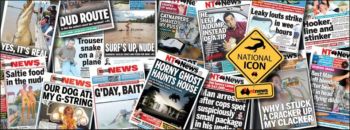
The NT News (Credit: Facebook)
Earlier this year, two Australian boys died in a car accident. The NT News, a News Corp. Australia-owned newspaper for the Northern Territory, published a front-page article shortly after their deaths. Though it was an attempt to offer a tribute to the boys, the newspaper’s coverage ran afoul of the Australian Press Council’s guidelines and upset some in the community. The reason: Rather than focus on the tragedy itself, the coverage focused on a 14-year-old girl who was friends with the two 15-year-old boys. The print headline for the Feb. 27, 2017 story was “He told me he loved me.”
One of the boy’s families complained about the article being offensive, but that family wasn’t alone. The mother of the girl photographed and featured in the article also complained to the press council, stating that the undue focus on her daughter caused the girl to be cyber-bullied.
NT News noted that the mother of the girl agreed to allow her daughter to be interviewed and photographed, so it wouldn’t apologize for that. However, it would apologize to her for the coverage causing offense. The press council agreed with that position, ruling that it was fair to publish the interview and girl’s photo.
But, the council said that NT News should have told the girl’s mother she would be the center of the story. “The Council considers that the publication failed to take reasonable steps to avoid causing substantial offence and distress to those close to the boys,” it ruled. “The public interest in the reporting on matters of road safety did not justify the prominent focus on the complainant’s daughter.”
NT News‘ editor Matt Williams told iMediaEthics by e-mail, “We have nothing to add to what’s in the adjudications.”
The aunt of one of the boys, Anne Lobo, felt it was offensive for the newspaper to focus on the friend instead of the boys’ families. The press council agreed. “Given the absence of comments or photographs from other friends or family, the heavy emphasis on the teenage girl and on her reaction and comments, and the likely emotional state of those affected, the article was likely to cause substantial offence and distress, without sufficient public interest,” the press council ruled. iMediaEthics has attempted to contact Lobo and the mother of the girl to ask if they are satisfied with the press council’s rulings.
NT News said it didn’t include comments from the family because both boys’ families were too upset to be interviewed. The press council did reject Lobo’s complaint that reporting on the boys’ deaths was an invasion of privacy.






